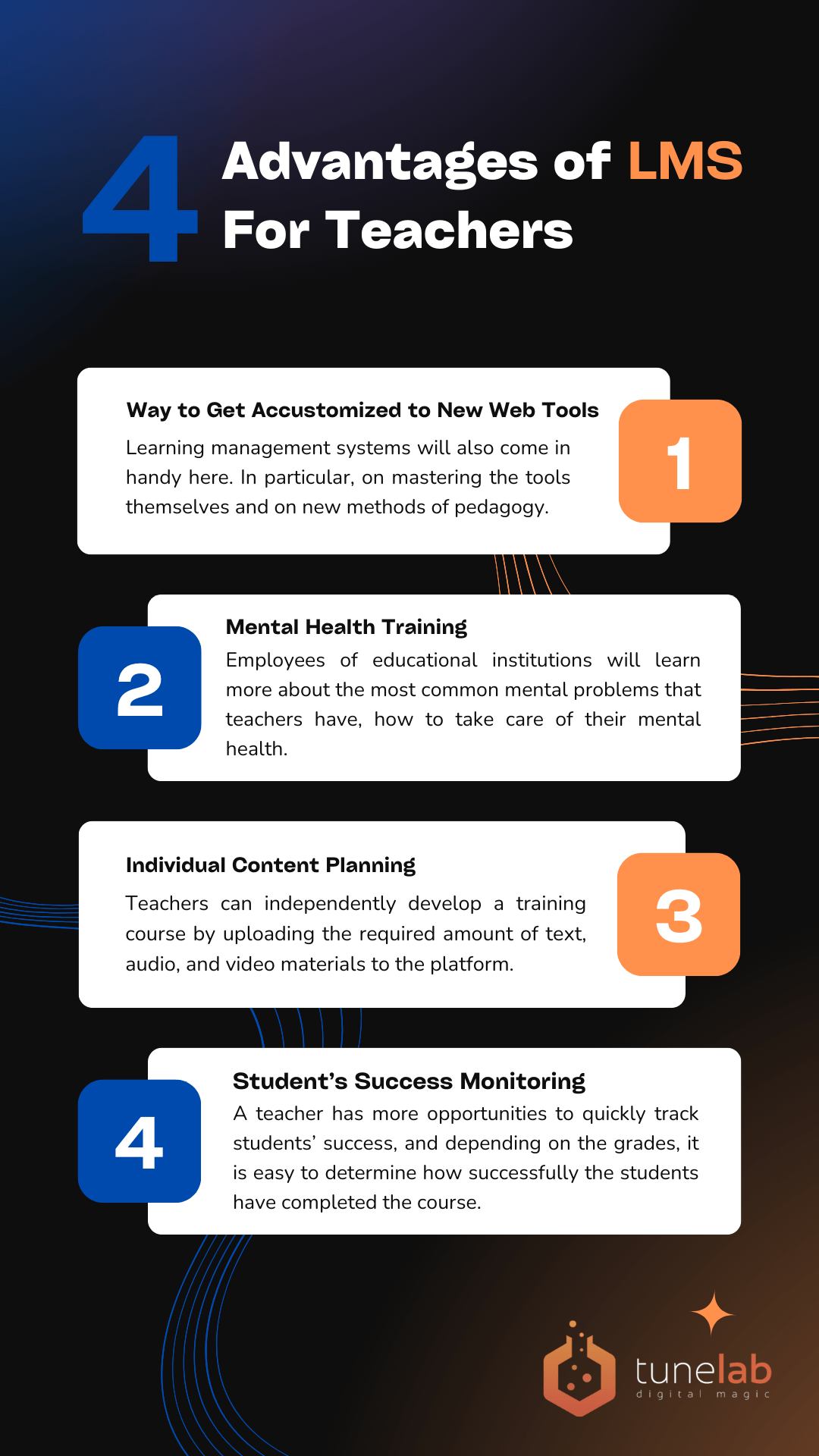Today, many educational institutions and private companies pay attention to Learning Management System, learning management systems that help optimize educational processes. An LMS software allows you to automate, organize, and manage the learning process. These platforms help both teachers and students to better interact in the learning environment, providing access to learning materials, and simplifying assessment and communication processes.
First of all, these platforms for remote learning have long been used for comfortable learning of both young and adult students in various fields: from classic school subjects to applied professional skills. It is quite logical that LMS platforms can be used by teachers who lecture educational material online and offline. So, in this article, we will look at why the use of LMS is becoming more common and how it helps teachers improve the efficiency and quality of teaching.
Boosting Teacher’s Professional Development with Learning Management Systems
Why is the Learning Management System useful for professional teachers? Undoubtedly, if a teacher wants to maintain their efficiency and development, they need to acquire new knowledge from time to time. In particular, teachers should constantly learn new teaching approaches, their subject, knowledge of which is constantly updated (from mathematics to theater arts), and also undergo psychological training in working with students (in particular, with children). LMS has been repeatedly proven as a convenient and flexible tool for acquiring new knowledge, thanks to which specialists can independently create an individual training schedule.
In addition, as mentioned in the previous article, LMS for teachers can be used as a stand-alone tool or in combination with other programs and offline professional development courses and courses.
The Key Advantages of LMS in Teacher Training and Continuing Education

First of all, teachers who use LMS have the opportunity to improve their qualifications and master the latest skills in using online tools in their work. A significant number of educational institutions are gradually moving to digital technologies to make learning more accessible – from working on PCs to AR/VR programs.
According to one of the latest statistics, approximately 90% of students prefer online learning, and almost 87% of respondents said that they use web programs for learning. It’s explained by the fact that modern students prefer visual and audio content, which would allow not only to learn, but also to understand the material using practical skills. This was realized by 93% of enterprises, which said that in 2024 they want to implement e-learning solutions in their work.
But what about teachers who are still not ready for innovations in the field of education? Web solutions such as learning management systems will also come in handy here. In particular, courses on mastering the tools themselves and on new methods of pedagogy. For example, this is the course from Europass Teacher Academy. In particular, the week-long Web Solutions for the Classroom course is designed for teachers who want to deepen their knowledge of web solutions, including Edmodo, Google Education tools, online quizzes, etc., and explore their strengths and weaknesses sides and how you can combine them in your work.
In addition to mastering web tools, a good teacher must have good psychological training in working with students. After all, 47% of teachers said that they feel depressed, anxious and experience panic attacks in connection with their work. And 67% of the interviewed teachers said that they feel nervous at work. Therefore, iHasco has developed online mental health training for teachers, consisting of four modules: Mental Health in Education, Mental Health Issues, Wellbeing Toolkit and Help from Outside. In all four modules, employees of educational institutions will learn more about the most common mental problems that teachers have, how to take care of their mental health, and the importance of psychological training for employees in education.
Another important advantage of LMS is that teachers can independently develop a training course by uploading the required amount of text, audio, and video materials to the platform. These courses, in addition to interactivity and gamification, will allow students to have a more flexible study schedule and opportunities to make up missed lessons. Yes, if a student misses an online lecture, he has the opportunity to receive a recorded lecture and listen to it in full.
Last but not least, the LMS includes a convenient system for monitoring student progress on the platform. Thus, the teacher will have more opportunities to quickly track which of the students is passing a particular module of the course, and depending on the grades, it is easy to determine how successfully the students have completed the course.
LMS increases the efficiency of teaching and learning by creating a flexible and convenient educational environment for both teachers and students. It simplifies the process of managing learning materials, provides access to necessary resources at any time, and helps teachers effectively monitor student progress. This not only improves the learning process, but also saves time that can be spent on developing new learning approaches.
For educational institutions, the learning management system opens opportunities for scaling educational programs, reducing the administrative burden and increasing the quality of interaction between teachers and students. LMS implementation allows creating a modern educational environment that meets the needs of both students and educational institutions, stimulating an innovative approach to learning.


